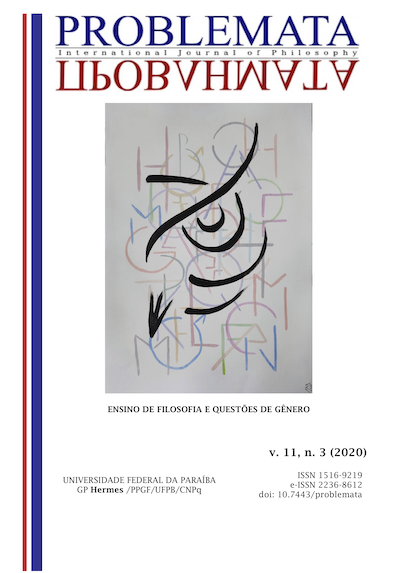KANT AND BUTLER, THE TEACHING OF THE PHILOSOPHIZING AND THE GENEALOGY OF THE GENDER
DOI:
https://doi.org/10.7443/problemata.v11i3.54035Keywords:
Kant, Butler, Philosophizing, Critique, GenderAbstract
the objective of this article is to present a possible path of approximation between philosophy teaching and gender issues. To this end, it seeks to dialogue with Immanuel Kant and Judith Butler and analyzes the meaning of "philosophizing teaching" for the genealogy of gender. In Kant, to teach philosophy is to teach thinking, a task possible only by means of the method, in view of the student’s immaturity in the use of understanding. Considering that the method is the critique, whose propaedeutic character is put at the service of something beyond itself or a future objective, it seems relevant to inquire about the place that could occupy in the investigations of the forms of construction of genres made by the thinker. In the same vein, the question is posed by a teaching of philosophy that deals, in gender issues, with investigating the conditions in which genders are distributed in society. It is believed that this way it can train students not only capable of thinking, but also and above all of deciding on their own destinies
Downloads
References
BUTLER, Judith. Problemas de gênero: feminismo e subversão da identidade. Tradução Renato Aguiar. Rio de Janeiro: Civilização Brasileira, 2016.
______. “O que é a crítica? Um ensaio sobre a cirtude de Foucault”. Tradução de Gustavo Hessmann Dalaqua. Cadernos De Ética E Filosofia Política, 1(22), 159-179, 2013. Recuperado de http://www.revistas.usp.br/cefp/article/view/59447
FOUCAULT, Michel. Nietzsche, a genealogia e a história. In.: ______. Microfísica do poder. Tradução Roberto Machado. Rio de Janeiro: Graal, 1979, p. 15-37.
______. “O que são as Luzes?”, In.: ______. Estética: literatura e pintua, música e cinema. Tradução Inês Autran Dourado Barbosa. Rio de Janeiro: Forense Universitária, 2009.
______. “O que é a crítica? Crítica e Aufklärung. Tradução Gabriela Lafetá Borges. Bulletin de la Societé française de phiposophie. Vol. 82, p. 35-63, Abr/Jun, 1990.
KANT, I. Fundamentação da metafísica dos costumes. Tradução Paulo Quintela, Lisboa: 70, 2005a.
______. “Resposta à pergunta: que é o Esclarecimento”. ______. Textos seletos. Tradução Raimundo Vier, Petrópolis-RJ: Vozes, 2005b.
______. Crítica da razão prática. Tradução Valerio Rohden, São Paulo: Martins Fontes, 2016.
______. Crítica da razão pura. Tradução Fernando Costa Mattos, São Paulo: Vozes, 2012.
______. Manual dos cursos de lógica geral. 2. ed. Tradução Fausto Castilho, Campinas-SP: Unicamp, 2002.
______. Pedagogía. Tradução Mariano Fernández Enguita. Madrid: Akal, 2003.
______. Idéia de História Universal de um ponto de vista cosmopolita. Tradução Rodrigo Naves, Ricardo R. Terra. São Paulo: Martins Fontes, 2003.
______. “Ensinar a pensar”. Tradução Desidério Murcho. Disponível em https://filoparanavai.blogspot.com/2010/04/textos-classicos-ensinar-pensar-por.html, consultado em 04/07/2020.
Downloads
Published
Issue
Section
License
Authors who publish with this journal agree to the following terms:
- Authors retain copyright and grant the journal right of first publication with the work simultaneously licensed under a Creative Commons Attribution License that allows others to share the work with an acknowledgement of the work's authorship and initial publication in this journal.
- Authors are able to enter into separate, additional contractual arrangements for the non-exclusive distribution of the journal's published version of the work (e.g., post it to an institutional repository or publish it in a book), with an acknowledgement of its initial publication in this journal.
-
- Authors are permitted and encouraged to post their work online (e.g., in institutional repositories or on their website) prior to and during the submission process, as it can lead to productive exchanges, as well as earlier and greater citation of published work (See The Effect of Open Access).





